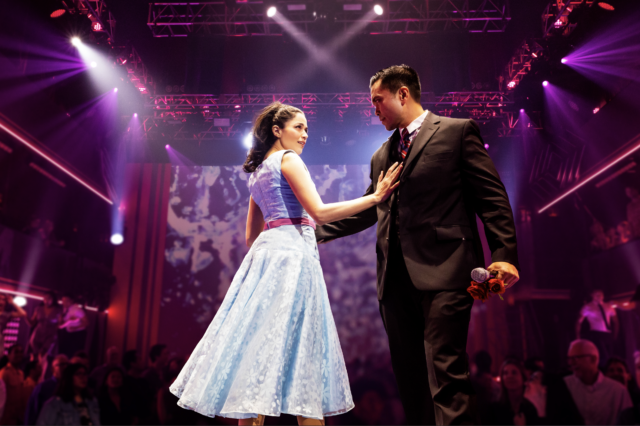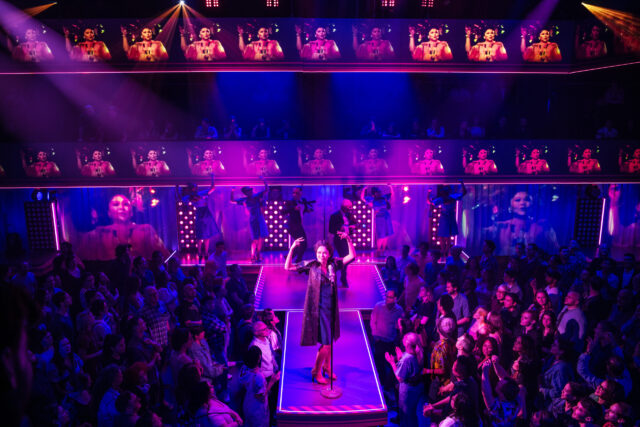
Imelda (Arielle Jacobs) and Ferdinand Marcos (Jose Llana) dance their way to power in Here Lies Love (photo by Billy Bustamante, Matthew Murphy, and Evan Zimmerman)
HERE LIES LOVE
Broadway Theatre
1681 Broadway at 53rd St.
Tuesday – Sunday through September 3, $49 – $299
herelieslovebroadway.com
“Why don’t you love me?” Imelda Marcos (Arielle Jacobs) asks in Here Lies Love, the fast-paced extravaganza thrilling audiences at the reconfigured Broadway Theatre. Obviously, she hasn’t been paying attention, too obsessed with greed, corruption, and power.
Here Lies Love started out as a 2010 concept album about Marcos by former Talking Heads leader David Byrne and musician and DJ Fatboy Slim, featuring Tori Amos, Steve Earle, Martha Wainwright, Natalie Merchant, Florence Welch, Cyndi Lauper, Nellie McKay, and others. The full-on show opened at the Public’s LuEsther Hall in 2013, when I called it “a spectacular, must-see event, an immersive, endlessly creative theatrical experience.” It’s still all that and more.
Set designer David Korins has ripped out most of the seats in the theater, so hundreds of people gather on the floor, where large rectangular platforms (nearly four feet high) are pushed around by stagehands while other crew members guide the audience like airplane safety ground handlers so revelers don’t get smushed. There are a few mezzanine rows on two sides of the theater; at one end there are two dozen rows of more traditional balcony seating, while at the other is the main stage. In the center of the room is a giant disco ball, evoking Marcos’s New York City penthouse, where she had one installed over a dance floor, and Studio 54, where she liked to party with celebrities.
Throughout the ninety-minute show, Peter Nigrini projects archival news footage, sociopolitical information, images of Johanna Poethig, Vicente Clemente, and Presco Tabios’s 1986 Lakas Samabayanan (“People’s Power”) mural, and live action, documenting Imelda’s determined rise from a poor childhood by winning a local beauty contest and moving to Manila, meeting and falling in love with the ambitious Ferdinand Marcos (Jose Llana), a military veteran and lawyer with major political aspirations.
Soon she’s swept into a life of position and wealth, although her public statements seem touchingly ingenuous. “The most important things are love and beauty. / It doesn’t matter if you’re rich or poor. / To prosper and to fly — / a basic human right. / The feeling in your heart that you’re secure,” she sings in the opening title number. “Is it a sin to love too much? Is it a sin to care? / I do it all for you. / How can it be unfair?” Most of the lyrics are taken directly from interviews, films, and public statements made by the characters; “here lies love,” for example, is the phrase Imelda wants engraved on her tombstone.
The Marcoses’ rise to power is being challenged by reformer Ninoy Aquino (Conrad Ricamora), a provincial mayor and governor who briefly dated Imelda before becoming a senator who correctly predicted what she and Ferdinand would do to the Philippines. “Out ev’ry night in New York and Paris / Champagne and dancing — while back here at home / People barely surviving — they’re living in shanties! / Our country’s in trouble — but the party goes on!” he declares, earning himself the top spot on their long list of enemies.

Here Lies Love follows the story of Imelda Marcos (Arielle Jacobs) through music and dance (photo by Billy Bustamante, Matthew Murphy, and Evan Zimmerman)
Another sad observer of Imelda’s transformation into an egotistical despot is her childhood friend Estrella Cumpas (Melody Butiu), who in some ways represents both the audience and the people of the Philippines. Once wealth and power come her way, Imelda quickly dumps Estrella. In one of the most touching scenes in the show, Estrella watches Imelda on her wedding day, but she is kept on the other side of a gate. Estrella is intent on standing by her friend as long as she can, explaining, “I know that you are in there somewhere / Letters get misplaced in the mail / Guess that there was some confusion / Amidst those throngs and swells / Did you see me outside? / Did you see me wave? / When you passed in your car / Ah, well, that’s okay — / How she looked when she passed by / How she looked when she passed by.” But Imelda has moved on, trying to erase her poverty-stricken past from her official story.
In 1965, Ferdinand became the tenth president of the Philippines, and for more than twenty years he ruled with an iron fist, having his rivals jailed and murdered, cheating on Imelda, silencing the media, establishing martial law, and lying to the populace as he grew ridiculously rich.
Shortly after the wedding, a press attaché (Jeigh Madjus) announces, “And the whole world can see / They’re our Jackie and John . . . What a picture they make / I’m so proud for us all.” But that’s not at all the way things turned out.
Tony-winning director Alex Timbers (Bloody Bloody Andrew Jackson, Moulin Rouge!) infuses Here Lies Love with nonstop energy spreading across the theater; while the central action follows Ferdinand, Imelda, and Ninoy, the ensemble moves and grooves to Olivier nominee Annie-B Parson’s electric choreography on podiums in the balcony, as if featured dancers in a nightclub. A ladder is occasionally wheeled to the balcony so the main characters can interact with the audience there.
The staging works on multiple levels, but, most important, it helps attendees experience some of what the Filipino people felt during the Marcoses’ ascent. At first, the crowd on the floor is sucked into Ferdinand’s populist campaign, cheering, shaking hands with him and Imelda, and eagerly posing with them for photos and videos. But soon after, they are at an Aquino rally, joining in the rage against the Marcoses’ rampant corruption.
Justin Townsend’s lighting is flashy and bold, splashing flickering colors everywhere. Clint Ramos’s colorful costumes are inspired by such traditional Filipino styles as the terno and the barong. M. L. Dogg and Cody Spencer’s pumping sound shakes the house, led by a fast-talking DJ (Moses Villarama) who keeps the party going even after the show is over. Music director J. Oconer Navarro guides the band across tender ballads and splashy disco and pop, with Joe Cruz on guitar, Derek Nievergelt on bass, and Jacqueline Acevedo, Gustavo Di Dalva, Brandon Ilaw, Paula Winter, and Yuri Yamashita on percussion.
Broadway’s first all-Filipino cast has Llana (The King and I, The 25th Annual Putnam Country Spelling Bee), Ricamora (The King and I, Soft Power), and Butiu (Doctor Zhivago, South Pacific) reprising their roles from the Public Theater production, and all three embody their characters with skill and confidence; Butiu is particularly touching as the friend left behind, essentially representing all the people the Marcoses steamrolled. Jacobs (In the Heights, Between the Lines) is almost too likable as Imelda, although you run out of sympathy for the woman known as the Iron Butterfly by the end. Jasmine Forsberg (Broadway Bounty Hunter, A Grand Night for Singing) is Maria Luisa and Imelda’s inner voice.
Through August 13, Tony winner Lea Salonga (Miss Saigon, Once on This Island) brings down the house as Aurora Aquino, Ninoy’s mother, singing the heartfelt “Just Ask the Flowers” dressed in all black, surrounded by black umbrellas. Kristina Doucette plays Ninoy’s wife, Cory; Timothy Matthew Flores is their son.
Oscar, Grammy, and Tony winner Byrne (Joan of Arc: Into the Fire, American Utopia) and Grammy winner Fatboy Slim (“Praise You,” “The Rockafeller Skank”) have ingeniously transformed the story of despicable despots into a cautionary tale and all-out dance celebration — and with only one mention of shoes.
Ferdinand died in 1986 at the age of seventy-two; Imelda, who concluded a nine-year run in the Philippine House of Representatives in 2019, is still alive, now ninety-four, and their son Bongbong, aka Ferdinand Marcos Jr., was elected president of the country in a landslide in 2022.
“Don’t let them look down on us,” Imelda calls out in “Please Don’t.” It seems she has little to worry about.
[Mark Rifkin is a Brooklyn-born, Manhattan-based writer and editor; you can follow him on Substack here.]